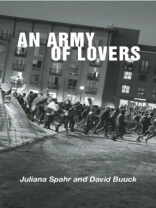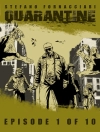‘This experimental work is not for the faint of heart, but it is laced with meditations that will appeal to readers concerned with poetry’s role in the world.’—
Publishers Weekly
‘I am fascinated by their attention to inequality, to questions of violence and community: something borne out by the collaboration itself.’—Bhana Kapil’s Best Books of 2013 on The Volta
‘
An Army of Lovers explores the liminal spaces where cities and individuals come together and stand apart with strange, brainy grace.’—Michelle Tea, author of
Mermaid in Chelsea Creek
‘By means of a series of stylistically and tonally various prose segments (by turns reflexive and dialogic, ironic and depressive, unhinged and hallucinatory, wetly emotional and dryly wry, including a detournement of a Raymond Carver story), the book centers, emotionally, on the ebb and flow of what it calls ‘struggle-force.’ Signature drone strikes, torture, ecological collapse, environmental illness and chronic fatigue syndrome: it’s all connected.’—Miranda Mellis,
Rain Taxi
‘The book offers many ways of approaching the age-old questions
What makes something art and
What makes someone a decent citizen, as well as (if not primarily) exploring the ways in which the answers to these questions might intersect. More impressively, it does so without being didactic and yet without being obscure, as so many efforts at high-concept art tend to be.’—Evan Karp,
SF Weekly
‘Fantastical, lyrical, whimsical and wildly experimental,
An Army of Lovers is as serious as it is absurd.’—Christopher Higgs, HTMLGIANT
‘This picaresque story about the ‘particular lostness’ of poetry, the ways poems always win and the lives of self-described ‘mediocre’ poets is actually pretty hilarious! It’s also smart, incisive and politically astute. Now, to the barricades!’—Rebecca Brown, author of
American Romances: Essays
An Army of Lovers begins with the story of two poets, Demented Panda and Koki, united in their desire to write politically engaged poetry at a time when poetry seems to have lost its ability to effect social change. Their first project is more than a failure, resulting in a spell that unleashes a torrent of raw sewage and surrealistic embodiments of consumerist excess and black site torture techniques. Subsequent chapters feature an experimental composer (Koki?) and a performance artist (Panda?) whose bodies are literally invaded with the ills of capitalism, manifested through leaking blisters and other maladies, as well as a radical remix of a Raymond Carver story, questioning “What We Talk About When We Talk About Poetry.” The novel concludes with Panda and Koki returning to the site of their failed collaboration to conjure up a more utopian vision of “an army of lovers.” Fantastical, lyrical, whimsical and wildly experimental,
An Army of Lovers is as serious as it is absurd.
Jadual kandungan
CONTENTS
Part One
A PICTURESQUE STORY ABOUT
THE BORDER BETWEEN TWO CITIES
Part Two
WHAT WE TALK ABOUT
WHEN WE TALK ABOUT POETRY
Part Three
THE SIDE EFFECT
Part Four
THE SIDE EFFECT
Part Five
AN ARMY OF LOVERS
Mengenai Pengarang
Juliana Spahr is the author of four books of poetry:
Well Then There Now (Black Sparrow P, 2011),
This Connection of Everyone with Lungs (U of California, 2005),
Fuck You-Aloha-I Love You (Wesleyan U, 2001), and
Response (Los Angeles: Sun & Moon P, 1996). She is the recipient of the 2009 Hardison Poetry Prize awarded by the Folger Shakespeare Library. In 2007 she published
The Transformation (Atelos), a book of prose which tells the story of three people who move between Hawai‘i and New York in order to talk about cultural geography, ecology, anticolonialism, queer theory, language politics, the academy, and recent wars. She edits with Jena Osman the book series Chain Links and with nineteen other poets she edits of the collectively funded Subpress. She has edited numerous critical anthologies and teaches at Mills College.
David Buuck is a writer and teacher who lives in Oakland, CA. He is the founder of BARGE, the Bay Area Research Group in Enviro-aesthetics, and co-founder and editor of
Tripwire, a journal of poetics. From 2003-08 he was associate editor at
Artweek, and from 2007-11 the President of the Board of Directors of Small Press Traffic, a literary nonprofit in San Francisco, where he also co-curated the annual Poets Theater festival.
The Shunt, a book of poetry about the Bush years, was published in 2009 by Palm Press. He is a proud member of Occupy Oakland and various related offshoots.












